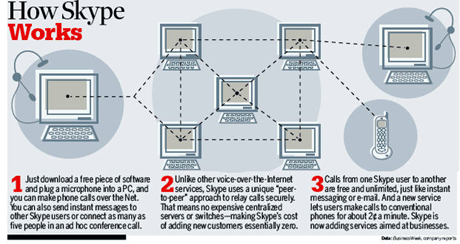Four reasons why: Skype is minor bandwidth hog compared to torrents and file-hosters

Germany-based Internet traffic management systems solutions provider ipoque has found that in much of the world excluding North America:
Skype accounts for 95 percent of all VoIP traffic, but that in the evening hours, Peer-to-peer accounts for more than 90 percent of bandwidth consumption.
An analysis of Internet traffic by German Internet traffic management systems provider ipoque has found that Skype accounts for 95 percent of all VoIP traffic on the net in a large part of the world, but P2P is the dominant consumer of bandwidth, accounting for as much as 95 percent of Internet bandwidth during the night.
"VoIP only accounts for one percent of the Internet traffic, but is used by 30 percent of all users," ipoque says. "Skype is by far the most popular Internet telephony application."
Despite Skype's popularity, it is believed to be accountable for as little as one percent of P2P traffic. BitTorrent traffic in videos, porn and movies is said to represent the most widespread P2P protocol.
Keep in mind these numbers are restricted to the Middle East, plus much of Europe. Still, it is interesting for us to consider what these numbers tell us.
First, Skype has some good things going for it. As Australia-based iTWire's Stuart Corner notes:
It (ipoque) attributes Skype's success in large part to its ability to negotiate firewalls, network address translation and other barriers that thwart standard VoIP protocols. "VoIP has become a commodity application, not least based on the enormous success of Skype with its ease of use and resilience to restrictive network environments due to widespread firewalling and network address translation (NAT). While standards-based VoIP systems using SIP, H.323 and IAX require manual configuration to get around the resulting limitations, Skype has many built-in mechanisms to automatically deal with such network conditions and to offer an as seamless as possible operation in most environments."
Second, some nations and regions examined in the survey don't offer widespread legal online or even legal retail (as opposed to counterfeit-dealling retail) outlets for legal purchases of videos, movies or porn. So for those who really need this stuff, there's BitTorrent, eDonkey, and other questionable means.
Third, there's more digital information in a video or porn (obviously some overlap there) being transferred than in a Skype call. That imbalance tends to inform the statistics that Skype may only be one percent of traffic despite the fact that 30 percent of Internet users in surveyed areas use it.
Fourth, again according to Corner's view of ipoque's findings, file hosting services eat up a good bit of the pie. He writes:
Another surprising consumer of bandwidth is file hosting services, also known as one-click file hosters, such as RapidShare and MegaUpload. These are operators of web servers where arbitrary files can be uploaded. The user gets a URL pointing to the uploaded file - the so-called Direct Download Link (DDL). This link can then be provided to other users for instance in Web forums or via e-mail. "Although file hosters are only used by a relatively small number of Internet users, they are responsible for between four and nine percent of all Internet traffic.," ipoque says.
